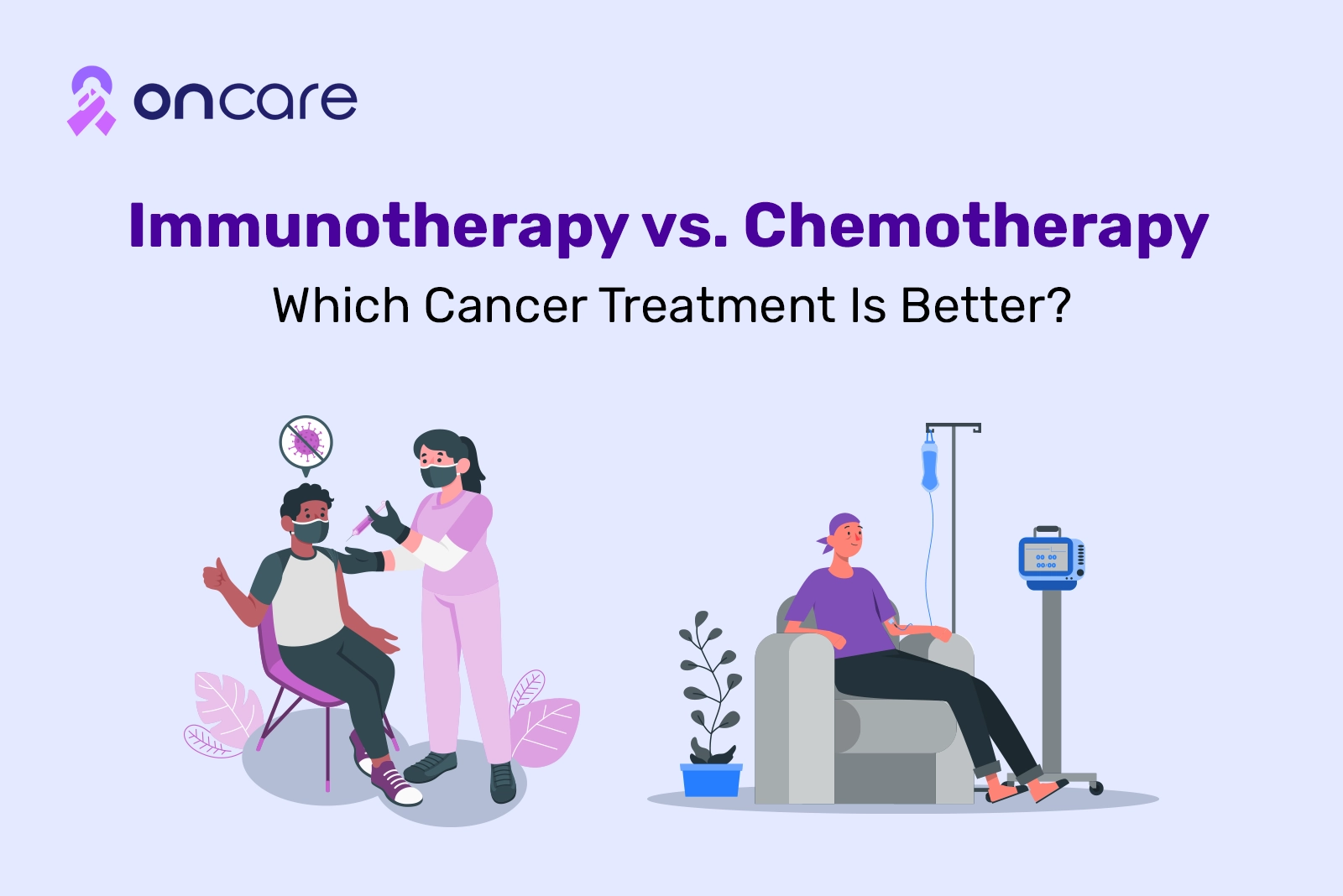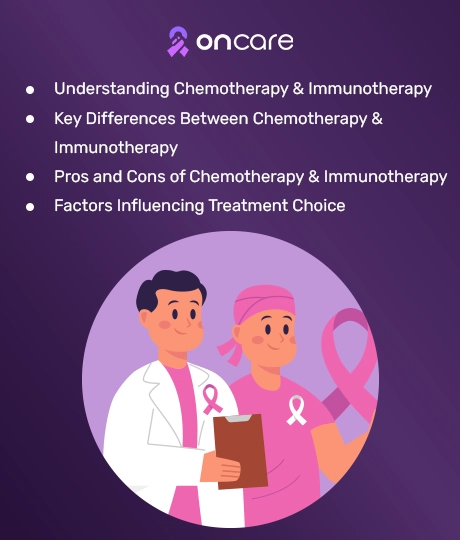Immunotherapy vs. Chemotherapy: Comprehensive Guide to Choosing the Right Cancer Treatment

Advancements in cancer treatment have led to significant progress in managing and tackling the disease, which offers multiple effective options for patients despite cancer's complex nature. Two of the most widely recognized treatments are chemotherapy and immunotherapy. While both aim to control or eliminate cancer, they differ significantly in their mechanisms and applications.
Understanding these differences is an essential step for selecting the most appropriate treatment based on individual conditions. At Oncare Cancer, we focus on guiding patients with expertise to ensure they receive personalized care tailored to their unique needs and requirements.
Understanding Chemotherapy and Immunotherapy
Chemotherapy is a key treatment for cancer. It uses strong medicines to destroy cancer cells or stop them from growing. These medicines target cells that divide quickly. Unlike treatments like surgery or radiation, chemotherapy works throughout the body, using the bloodstream to reach all areas. This helps treat visible tumors and tiny cancer cells that may have spread to other parts of the body, making it effective for cancers at various stages.
Immunotherapy is a newer approach to cancer treatment. It uses advanced medicines, including immune checkpoint inhibitors, monoclonal antibodies, and CAR-T cell therapy, to boost the body's natural immune response against cancer.
At Oncare Cancer, we use advanced technologies to provide personalized therapeutic cancer treatments according to your needs.
Also Read : Chemotherapy vs Immunotherapy: Which Cancer Treatment is Right for You?

Key Differences Between Chemotherapy and Immunotherapy
While both therapies are designed to fight cancer, their differences lie in their mechanisms, response rates, and overall patient experience. Below are key differences to choose from:
How They Work:
Chemotherapy targets and kills cells that divide quickly. Cancer cells grow out of control, so chemotherapy drugs are very good at stopping this growth. These drugs spread through the bloodstream to find and destroy rapidly dividing cells throughout the body. While this includes cancer cells, some healthy cells that divide quickly, such as those in the digestive tract, hair follicles, and bone marrow, can also be affected.
Immunotherapy works differently, using the power of the body's immune system to identify and eliminate cancer cells. This is achieved by stimulating the immune system or modifying immune responses to improve their effectiveness against cancer. For example, immune checkpoint inhibitors block certain proteins that cancer cells use to hide from immune attacks. Immunotherapy generally spares healthy tissues.
Common Uses:
Chemotherapy is highly versatile and is used across a wide range of cancers, including breast cancer, lung cancer, and colorectal cancer. It can be used on its own or together with other treatments, such as surgery and radiation. For example, in neoadjuvant therapy, the initial treatment is used to reduce the size of a tumor before undergoing the primary treatment, typically surgery, while adjuvant therapy helps destroy any remaining cancer cells post-surgery. Chemotherapy is particularly effective for cancers with rapid cell division, regardless of their genetic or molecular profiles.
Immunotherapy is more specialized, often reserved for cancers with specific biological characteristics. For instance, cancers with high mutational burdens, such as melanoma and non-small cell lung cancer, often respond well to immunotherapy drugs like immune checkpoint inhibitors. Immunotherapy’s focus on boosting the immune response makes it a preferred choice for cancers that have developed mechanisms to avoid immune detection.
At Oncare Cancer, our dedicated oncologists help you choose the right treatment course based on your specific cancer type and overall health condition.
Duration of Treatment
Chemotherapy is typically administered in cycles, with each cycle lasting from one to several weeks. The duration of treatment varies, influenced by factors such as the cancer type, disease stage, and specific chemotherapy drugs used. In most cases, the treatment plan spans weeks to months. The frequent sessions during this period require close monitoring to manage side effects and assess the response to treatment.
Immunotherapy, in contrast, involves fewer sessions spread over a longer period. Maintenance therapy with immunotherapy can extend for months or even years, especially in advanced or metastatic cancers where long-term control is the goal. The less intensive schedule can improve the quality of life for patients, but it also requires sustained commitment and monitoring for potential immune-related side effects.
Response Rates
Chemotherapy is known for its rapid and measurable effects, especially in cancers that are highly proliferative, such as aggressive lymphomas or small-cell lung cancer. However, its ability to achieve long-term remission is limited in some cases. Additionally, cancer cells can develop resistance to certain chemotherapy drugs, necessitating changes in treatment.
Immunotherapy, though not universally effective, has shown remarkable results in certain cancers. For example, checkpoint inhibitors have led to long-term remission in some patients with advanced melanoma or non-small cell lung cancer. However, its effectiveness can be limited by factors like the patient’s immune profile and the cancer’s ability to suppress immune responses. In some cases, immunotherapy may take longer to show results compared to chemotherapy, as it works by gradually enhancing immune activity.
Side Effects
For patients undergoing chemotherapy, some of the most common side effects include nausea and vomiting, which can often be managed with anti-emetic medications prescribed by oncologists. Hair loss, although a temporary and emotional challenge for some, is a sign that the treatment is actively targeting rapidly dividing cells, including cancer cells. Fatigue, another common effect, is generally temporary and improves after the completion of treatment. Additionally, chemotherapy may reduce white blood cell counts, slightly increasing the risk of infections, but this is manageable by maintaining good hygiene and, in some cases, having medications to boost immunity.
Immunotherapy, a newer and more targeted approach, also has side effects, but they differ from those of chemotherapy. Some patients may experience flu-like symptoms such as fever, chills, and fatigue, which are usually mild and manageable. In rare cases, overactivation of the immune system may cause inflammation in healthy tissues, such as the lungs (pneumonitis) or liver (hepatitis). Skin reactions, like rashes or itching, might occur, but these are generally minor and temporary.
Cost:
The chemotherapy cost in India usually varies between 50,000 to 2,00,000 for each cycle. This variation depends on the type of cancer being treated, the specific chemotherapy drugs prescribed, and the treatment facility.
For example, in metropolitan cities like Mumbai, Delhi, or Bangalore, costs may be on the higher end due to advanced facilities and infrastructure. Smaller cities or government hospitals may offer more affordable options, though the availability of the latest drugs might be limited.
Immunotherapy cost in India is generally higher, averaging 2,50,000 to 5,00,000 per cycle. The expense reflects the advanced nature of immunotherapy drugs and the precision techniques involved in their administration. The cost may also depend on the type of immunotherapy, such as CAR-T cell therapy or monoclonal antibody treatments, which are more expensive.
At Oncare Cancer, we customise treatment packages to make therapeutic cancer treatments more accessible and budget-friendly based on individual health needs.
Also Read : Chemotherapy vs. Radiation Therapy: Key Differences and Uses
Pros and Cons of Chemotherapy and Immunotherapy
Chemotherapy and immunotherapy have their advantages and disadvantages. Knowing the pros and cons of each can help you make an informed decision.
Chemotherapy
Pros:
- Highly effective in treating a wide range of cancer types and stages, offering versatile treatment options.
- Can be combined with other treatments like surgery and radiation for a comprehensive approach to cancer care.
- Backed by decades of research and clinical success, it is a reliable and well-understood standard of care.
- Widely available at cancer treatment centers like Oncare Cancer, ensuring access to quality care across different regions.
Cons
- Systemic in nature, which means it can affect healthy cells.
- May not always be suitable for achieving long-term cancer control or remission.
- Requires frequent sessions, which can be time-consuming and physically demanding.
Immunotherapy
Pros
- Targets cancer cells more precisely, minimizing damage to healthy tissues compared to chemotherapy.
- Involves less frequent treatment sessions, which can improve the patient’s quality of life.
Cons
- High immunotherapy costs can make it less accessible for some patients.
- Results depend on individual patients and cancer characteristics.
- May take longer to show results, requiring patience and ongoing monitoring.
- Limited availability in certain regions or hospitals.
Factors Influencing Treatment Choice
Choosing the right treatment is a multifaceted decision that depends on several individual factors.
Type and Stage of Cancer
Certain cancers respond better to specific therapies. For example, chemotherapy is often the first-line treatment for aggressive cancers, while immunotherapy may be preferred for advanced-stage cancers with particular genetic markers. At Oncare Cancer, our expert oncologists ensure that every patient receives suitable treatments based on their cancer type and stage.
Patient Health and Comorbidities
A patient’s overall health, age, and medical conditions play a critical role. Patients with compromised immune systems may face challenges with immunotherapy, while those prone to infection may struggle with chemotherapy.
Frequency of Treatment
Chemotherapy often requires frequent sessions, sometimes multiple times a week. Immunotherapy sessions are spaced further apart, offering more convenience for some patients.
Conclusion
The choice between chemotherapy and immunotherapy represents a critical step in a patient’s cancer treatment journey. Both have advantages, limitations, and applications.
At Oncare Cancer, our team of experienced oncologists will work closely with you to develop a personalized treatment plan tailored to your unique needs. We are dedicated to empowering patients with knowledge and expert guidance.
Frequently Asked Questions (FAQs)
The success of cancer treatment largely depends on the stage at which the cancer is diagnosed. Chemotherapy is effective across a wide range of cancers, while immunotherapy has shown remarkable results in specific cancers, such as melanoma and non-small cell lung cancer.
The success rates vary. Chemotherapy often shows immediate tumor reduction but may not always provide long-term control. Immunotherapy can offer durable remission in certain cancers, but its effectiveness depends on individual factors and cancer type.
Cancers such as melanoma, non-small cell lung cancer, kidney cancer, bladder cancer, and some types of lymphoma respond best to immunotherapy.
Immunotherapy is generally more expensive; immunotherapy cost in India range from 2,50,000 to 5,00,000 per cycle, compared to chemotherapy cost in India 50,000 to 2,00,000 per cycle. Cost totally depends on the type, hospital, severity, and location.
While immunotherapy has shown the potential to extend life and even lead to remission in some stage 4 cancers, it is not guaranteed to cure all cases. Results depend on the type of cancer and the patient's response.
Immunotherapy tends to have fewer systemic side effects compared to chemotherapy but can still cause immune-related complications. The safety of each treatment depends on the patient's health and the specific cancer being treated.